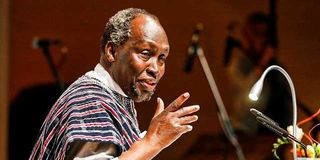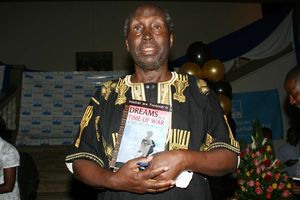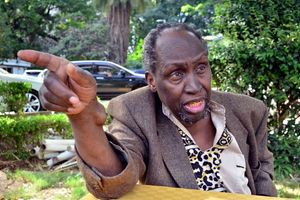
Celebrated Kenyan author and scholar Prof Ngugi wa Thiong’o.
It is both a sombre and profoundly honourable moment for us at East African Educational Publishers (EAEP), to pay tribute to one of Africa’s greatest literary icons—the late Professor Ngugi wa Thiong’o.
The weight of this moment is not just in mourning a man, but in celebrating a legacy—one that has shaped the intellectual, cultural and linguistic identity of this continent and far beyond.
Ngugi wa Thiong’o was more than a celebrated writer. He was not just a literary luminary, he was a sage; a man endowed with a wealth of wit and wisdom.
He traversed the literary landscape like a colossus, and was at home with virtually all literary genres: the novel, the short story, drama, poetry, essays and even children’s literature.
At EAEP, we are honoured to have been the custodians of his enduring works. Our journey with Ngugi spans decades, and in that time, we were not just his publishers—we were partners in a literary movement.
His works are a cornerstone of our catalogue, and his values are embedded in the DNA of our mission.
Ngugi was a pioneer in more ways than one. One of his most significant contributions to literature—and to African consciousness—was his insistence on the centrality of African languages in intellectual and creative expression.
He did not just speak about decolonisation; he embodied it. His widely acclaimed essays, published in the book “Decolonising the Mind”, have continued to both challenge and inspire not just Africans, but audiences of the global community. In “Decolonising the Mind”, he reminded us that language is not neutral—it is political, cultural, and spiritual.
He helped mould the culture of promoting indigenous languages into print. At a time when African languages were pushed to the margins, Ngugi insisted they take centre stage.
He urged writers to write in their mother tongues, encouraged publishers to take up the mantle of linguistic liberation, and challenged institutions to recognise the power and legitimacy of local languages.
EAEP resonated with his clarion call, and has published books in more than 30 indigenous languages spoken in Kenya, Rwanda and Zambia.
Through his enduring works, he became a global champion of indigenous languages and a stalwart of culture. As such, it is true to say that we have not lost, for Ngugi is still with us everywhere, and his legacy lives on with us.
When we read his works, and see his milestones, we remember his voice, his passion, his vision. He lives in every classroom and lecture theatre where his books are studied, in every mind awakened by his ideas, in every writer inspired to tell their story without compromise.
As such, even as we grieve, we do not despair. Ngugi’s journey did not end with his final breath—it continues in the movement he began, in the minds he transformed, and in the institutions he challenged and strengthened.
The baton has been passed, and it is now our responsibility to ensure that the paths he carved do not grow cold and forgotten.
At EAEP, we recommit ourselves to the values he held dear: literary excellence, cultural authenticity, linguistic diversity, and social justice. We will continue to publish and promote voices that honour his legacy. We will continue to celebrate our languages, our stories, and our truth.
At a personal level, allow me to share an encounter—one that shaped my literary consciousness and, indeed, my identity. I first met him, through his book, “Weep Not, Child”, when I was in Form One.
The book had a profound impact on me at that early age, which impact was concretised when my teacher of English told us about Ngugi’s “Damascus moment”, which made him discard his Christian (English?) name, James, and proudly adopt his Gikuyu name, Ngugi wa Thiong’o. I followed suit. I disowned my English name and branded myself Kiarie Kamau.
Years later, I was to physically meet him in 2004, when he returned to the country after 22 years of exile. The EAEP team that was in charge of welcoming Ngugi came up with an apt theme for the festivities—“Reviving the Spirit”.
And indeed, he revived the spirit—the spirit of vibrant reading, the spirit of public lectures, the spirit of literary debates, which culminated in his launch of “Murogi wa Kagogo” (later released in English as “Wizard of the Crow”).
I had the privilege of doing the final editorial work on “Murogi wa Kagogo”, and worked closely with Ngugi to ensure that the outcome would be great.
That is when I interacted with his keen eye for detail, his patience, his energy that made him work for hours on end, his desire to consult as widely as possible, and his sharp intellect that would make him rework and revise sections of the book after hours of discussions.
It was, therefore, not just an editorial task; it was a learning experience. With each manuscript, I encountered not just narrative brilliance, but a man deeply invested in the integrity of every word and every line.
Although he suffered ill health during his twilight years, Ngugi remained strong and steadfast, and if one conversed with him on the telephone, one would not realise that he was actually indisposed.
Our recent chat was a week ago. He had persistently called my number, but unfortunately I could not immediately take the call because I was chairing a meeting.
As soon as I was done with the meeting, I called him, and as usual he wanted to touch base with what was happening in his motherland, Kenya. Yet, even as he sought to get insights from the ground, he had already gathered enough information from internet sources, and he would ask leading questions to confirm what he had read.
That was vintage Ngugi, a down-to-earth, nay, gentle giant that valued feedback and insights from all and sundry. As his publishers, we were always in awe of his humility, accommodating nature and patience.
Although he was a bosom friend of the late Chairman of EAEP, Dr Henry Chakava, Ngugi was always keen to directly interact with his editor, and would never circumvent the process of publishing by invoking the name of his friend.
In closing, I want to say—on behalf of our entire EAEP family, the literary community, and all those whose lives were touched by this remarkable man—thank you, Ngugi wa Thiong’o.
Thank you for your brilliance. Thank you for your courage. Thank you for never giving up on Africa. You are not gone—you have become the story.
Mr Kiarie is the chief executive officer of East African Educational Publishers (EAEP).
Also read the first article in this series --> Ngugi wa Thiong’o: Life and Times
And the second one in the series --> Exiled Ngugi: From Ngaahika Ndeenda troubles to an international career
You may also check out this one --> World mourns as Ngugi turns into ‘a grain of wheat’
Also check this out --> 5 things you should know about Ngũgĩ wa Thiong'o







